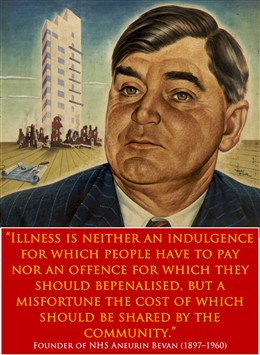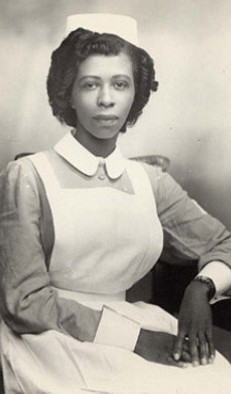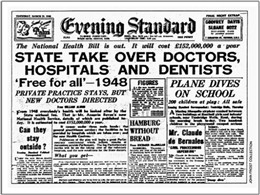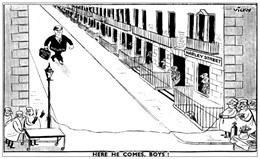Towards A New Jerusalem

Labour health Secretary Aneurin Bevan established the NHS on 5th July 1948
Royal College of Nursing

The Windrush generation that came to Britain after 1948 helped to forge the NHS
Royal College of Nursing

THe NHS made headlines on July 5th 1948 with what many saw was the realsiation of a New Jerusalem
London Evening Standard 1948

Nye Bevan faced resistance from doctros reluctant to be part of the NHS.
Royal College of Nursing
World War II and the creation of the National Health Service
By Lucy Robjohns
Nye Bevan
Aneurin Bevan is seen as the father of the National Health Service. He was born into a mining family on the 15th of November, 1897 in Tredegar, Wales and joined the South Wales Miners’ Federation early on in his life. Bevan was inspired by the Tredegar Medical Aid Society which provide medical servicesto miners and workers through the collection of small weekly contributions. It grew quickly, and within a few decades supported most of the local population. Tredegar inspired Bevan to believed that his home town possessed a blue print for the creation of a national health service.
Labour Landslide
In 1945 following Clement Attlee’s landslide victory over Winston Churchill, Bevan was appointed Minister of Health and introduced the National Health Services Act of 1946. The act faced heavy opposition from Winston Churchill as well as the British Medical Association. Churchill believed that Britain could not afford the extravagance of the NHS when it needed to repay its war debts. Bevan also had to overcome fierce resistance from doctors who believed the NHS would destroy their lucrative private work and burden them with an impossible work load. Bevan overcame their resistance by allowing them to keep their private patients and offered them extra money to treat N.H.S. patients. In his words,
“I stuffed their mouths with gold.”
High demand for the NHS
Following the enactment of the National Health Service, millions of people had access to healthcare that they lacked before 1948. This led to massive increases in demand for every sort of medical service. The Aberdeen Press and Journal reported that “more than a million people applied for free dental treatment” within the first two months of the NHS. In Gloucester, council opticians reported at the start of the 1949 that they were receiving 300 applications for glasses every day, around 27,000 in total since July of 1948. Hospitals all over reported nursing and bed shortages, as well as long waiting lists.
The Windrush Generation
Within Britain, there simply were not enough medical professionals and no way to hire and train them quickly. The solution to this came with the British Nationality Act of 1948, which granted subjects of the British Empire and its colonies citizenship and the opportunity to settle in Britain. The first group of immigrants came on the HMT Empire Windrush, bearing hundreds of men and women from the Caribbean looking to make a new life for themselves. Thousands of immigrants from all over the world came to Britain from 1948 to 1962, when the first limitations on immigration were instated, and became known as the “Windrush Generation.”